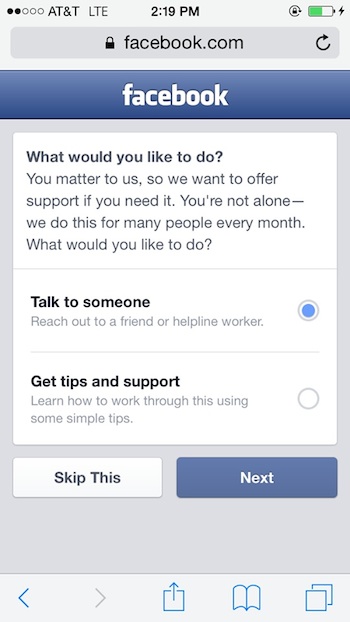 Facebook has partnered with several mental health organizations including Forefront, Now Matters Now, the National Suicide Prevention Lifeline, and Save.org to offer its users more tools to help those who may be considering committing suicide.
Facebook has partnered with several mental health organizations including Forefront, Now Matters Now, the National Suicide Prevention Lifeline, and Save.org to offer its users more tools to help those who may be considering committing suicide.
Facebook already offers users a way to report a friend's post if a user thinks their friend has posted suicidal content. Now, Facebook has rolled out additional resources for the person who posted the suicidal content.
"For those who may need help we have significantly expanded the support and resources that are available to them the next time they log on to Facebook after we review a report of something they’ve posted," Facebook Product Manager Rob Boyle and Facebook Community Operations Safety Specialist Nicole Staubli explained in a post. "Besides encouraging them to connect with a mental health expert at the National Suicide Prevention Lifeline, we now also give them the option of reaching out to a friend, and provide tips and advice on how they can work through these feelings. All of these resources were created in conjunction with our clinical and academic partners."
The social networking giant also included resources so that the person reported another Facebook user's content can also help their friend.
"We’re also providing new resources and support to the person who flagged the troubling post, including options for them to call or message their distressed friend letting them know they care, or reaching out to another friend or a trained professional at a suicide hotline for support," the post continues.
These features will roll out to US-based Facebook users over the next couple of months.
Though it hasn't made many dramatic moves in the healthcare space, Facebook has made some big investments in related areas.
In April 2014, Facebook acquired Finland-based fitness app maker Protogeo for an undisclosed sum. The company’s high-profile app, called Moves, passively tracks a user’s daily activity using the phone’s built-in accelerometer in order to provide all-day tracking without killing the phone’s battery.
And a month prior, Facebook acquired Oculus Rift for more than $2 billion. During a call with reporters and analysts following the announcement, Facebook CEO Mark Zuckerberg explained that while Oculus will continue to focus on gaming in the short term, the deal was more about placing a bet on the next big computing platform shift, which could include a telemedicine play.




















